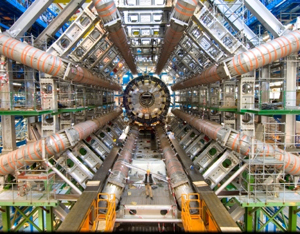Lancaster Scientists take part in Big Bang experiment

© CERN
Physicists from Lancaster University have flown out to Switzerland to take part in the world’s biggest science experiment.
On Wednesday, 10th September, the Large Hadron Collider (LHC) at the European Laboratory for Particle Physics (CERN) in Geneva was switched on.
The LHC, 100m below ground, is the most powerful particle accelerator ever built by man. The experiment aims to re-create the conditions just after the Big Bang in an attempt to answer fundamental mysteries of the Universe - from antimatter to dark matter and the existence of extra dimensions.
Lancaster University Physics Department has a leading role in this project as both a major player in one of the LHC experiments (ATLAS) as well as the development of part of this detector.
The Department has also helped construct the powerful computing systems used to analyse the data from the experiment and part of this system is hosted at Lancaster.
Once the experiment is underway the total data produced by the ATLAS experiment each year will be 30 million Gigabytes, the equivalent of 600,000 top of the range iPods, which would cover over 500 tennis courts. The University has a large ‘farm’ of computers - equivalent to about 600 PCs - to help this work. It also has lots of disks to store the data.
Lancaster is leading the studies of so-called ‘beauty’ particles in ATLAS, which is one route to find the explanation of the missing antimatter and of the dark matter. The University is also studying the heaviest of the subatomic constituents, the top quark, and trying to uncover so called ‘hidden’ super symmetry.
Roger Jones Professor of High Energy Physics and Head of Lancaster University ATLAS Group, was in Geneva for the switch-on.
He said: “This is a tremendously exciting time for science. This colossal machine will be attempting to recreate the conditions that occurred very briefly after the Big Bang, from which our Universe emerged.
“The experiments attached to the accelerator hope to answer some of the fundamental mysteries of the universe such as why things have mass and where the antimatter went – questions Galileo, Newton and Einstein could not answer.”
Members of the High Energy Physics Division were also in the Foyer of the Lancaster University Physics Building on the morning of Wednesday 10th September to answer questions and give demonstrations about Lancaster’s work in this area.